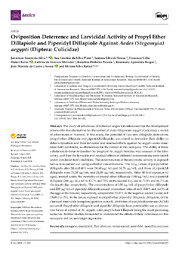Oviposition deterrence and larvicidal activity of propyl ether dillapiole and piperidyl dillapiole against Aedes (Stegomyia) aegypti (Diptera: Culicidae).
Oviposition deterrence and larvicidal activity of propyl ether dillapiole and piperidyl dillapiole against Aedes (Stegomyia) aegypti (Diptera: Culicidae).
Author(s): SILVA, J. S. da; PINTO, A. C. da S.; SOUZA, S. S. de; CHAVES, F. C. M.; MEIRELES, S. da F.; PEREIRA, R. P.; ROQUE, R. A.; SOUSA, J. M. de C. e; RAFAEL, M. S.
Summary: The study of substances of botanical origin is fundamental for the development of new effective alternatives for the control of Aedes (Stegomyia) aegypti (Culicidae), a vector of arboviruses in humans. In this study, the potential of two new dillapiole derivatives, propyl ether dillapiole and piperidyl dillapiole, was tested to determine their ability to deter oviposition and their larvicidal and residual effects against Ae. aegypti under simulated field conditions, as alternatives for the control of this mosquito. The ability of these substances to deter oviposition by pregnant Ae. aegypti females was assessed in the laboratory, and then the larvicide and residual effects of different concentrations were tested under simulated field conditions.
Publication year: 2025
Types of publication: Journal article
Unit: Embrapa Western Amazon
Keywords: Aedes aegypti, Enzymes, Insecticidal, Mortality, Mosquito, Piper aduncum, Semi-field, Vector control
Observation
Some of Embrapa's publications are published as ePub files. To read them, use or download one of the following free software options to your computer or mobile device. Android: Google Play Books; IOS: iBooks; Windows and Linux: Calibre.
Access other publications
Access the Agricultural Research Database (BDPA) to consult Embrapa's full library collection and records.
Visit Embrapa Bookstore to purchase books and other publications sold by Embrapa.

